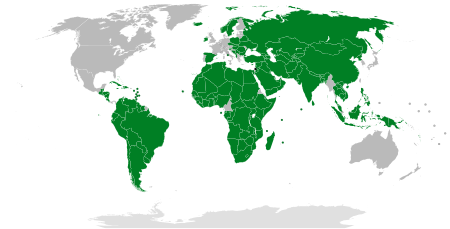
Back الاعتراف الدولي بدولة فلسطين Arabic Mezinárodní uznání Státu Palestina Czech Cydnabyddiaeth Ryngwladol o Wladwriaeth Palesteina Welsh Internationale Anerkennung des Staates Palästina German Διεθνής αναγνώριση του Κράτους της Παλαιστίνης Greek Reconocimiento internacional de Palestina Spanish Palestiina tunnustamine Estonian Palestinako Estatuaren nazioarteko aintzatespena Basque بهرسمیتشناسی بینالمللی دولت فلسطین Persian Palestiinan kansainvälinen asema Finnish

As of May 2024, the State of Palestine is recognized as a sovereign state by 143 of the 193 member states of the United Nations. It has been a non-member observer state of the United Nations General Assembly since November 2012.[1][2]
The State of Palestine had been officially declared by the Palestine Liberation Organization (PLO) on 15 November 1988, claiming sovereignty over the internationally recognized Palestinian territories: the West Bank, which includes East Jerusalem, and the Gaza Strip. By the end of 1988, the Palestinian state was recognized by 78 countries.[3][4]
In an attempt to solve the decades-long Israeli–Palestinian conflict, the Oslo Accords were signed between Israel and the PLO in 1993 and 1995, creating the Palestinian Authority (PA) as a self-governing interim administration in the Gaza Strip and around 40% of the West Bank.[5] After the assassination of Yitzhak Rabin and Benjamin Netanyahu's ascension to power, negotiations between Israel and the PA stalled, which led the Palestinians to pursue international recognition of the State of Palestine without Israeli acquiescence.
In 2011, the State of Palestine was admitted into UNESCO; in 2012, after it was accepted as an observer state of the United Nations General Assembly with the votes of 138 member states of the United Nations, the PA began to officially use the name "State of Palestine" for all purposes.
Among the G20, ten countries (Argentina, Brazil, China, India, Indonesia, Mexico, Russia, Saudi Arabia, South Africa, and Turkey) have recognized Palestine as a state,[note 1] while nine countries (Australia, Canada, France, Germany, Italy, Japan, South Korea, the United Kingdom, and the United States) have not.[note 2] Although these countries generally support some form of a two-state solution to the conflict, they take the position that their recognition of a Palestinian state is conditioned to direct negotiations between Israel and the PA.
- ^ United Nations A/67/L.28 General Assembly Archived 1 December 2012 at the Wayback Machine. 26 November 2012.
- ^ "Palestinians win implicit U.N. recognition of sovereign state". Reuters. 29 November 2012. Retrieved 29 November 2012.
- ^ United Nations Educational, Scientific; Cultural Organization, Executive Board (12 May 1989). "Hundred and thirty-first Session: Item 9.4 of the provisional agenda, Request for the Admission of the State of Palestine to UNESCO as a Member State" (PDF). United Nations. pp. 18, Annex II. Retrieved 15 November 2010. The list contains 92 entries, including a number of states which no longer exist.
- ^ Tessler, Mark (1994). A History of the Israeli–Palestinian conflict (2nd, illustrated ed.). Indiana University Press. p. 722. ISBN 978-0-253-20873-6. "Within two weeks of the PNC meeting, at least fifty-five nations, including states as diverse as the Soviet Union, China, India, Greece, Yugoslavia, Sri Lanka, Malta, and Zambia, had recognised the Palestinian state."
- ^ "Declaration of Principles on Interim Self-Government Arrangements (Oslo Accords) | UN Peacemaker". peacemaker.un.org. Retrieved 21 January 2021.
Cite error: There are <ref group=note> tags on this page, but the references will not show without a {{reflist|group=note}} template (see the help page).
© MMXXIII Rich X Search. We shall prevail. All rights reserved. Rich X Search